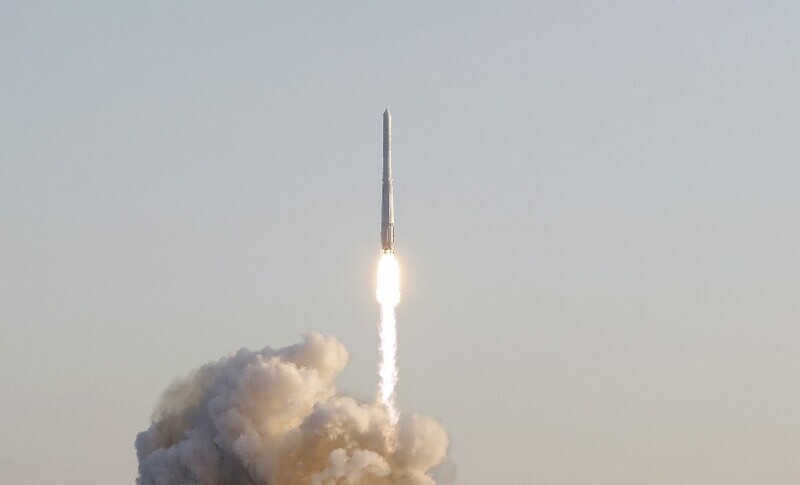hankyoreh
Links to other country sites 다른 나라 사이트 링크
[Column] Where will S. Korea stand in the astropolitical order?


By Kwak No-pil, senior staff writer
South Korea’s homegrown Nuri rocket made its first flight into space in October. As it so happens, that’s an extremely significant month in the history of global space exploration.
Oct. 4, 1957, was the day that the Soviet Union inaugurated the Space Age by launching the world’s first satellite. Oct. 10, 1967, was the day that the Outer Space Treaty took effect, governing the exploration and use of space. The UN celebrates the week spanning those two dates (Oct. 4 to Oct. 10) as World Space Week.
This October also saw some new space records being set. The first feature film was shot in space last month, while a 90-year-old became the oldest person to go on a space flight.
Korea nearly became the seventh country to launch a satellite weighing 1 ton or more. That would have added another milestone to the October calendar. At the last moment, the satellite didn’t make it into orbit, but the knowledge gained about space flight is itself a great accomplishment.
It’s encouraging to think that Korea has achieved so much on its own in an area where technology transfer is prohibited. I look forward to seeing the mission completed next time with the successful placing of a satellite into orbit.
The launch vehicle is the most critical component of a space program. Depending on its cargo, a launch can impact various areas — from national security to the economy and the environment. Thus, this technology is a double-edged sword, carrying the potential not only for prosperity but also for destruction.
Since the latter half of the 20th century, space has become a new geopolitical tool in “Pax Americana.” The geopolitical value of space will only grow with time. That much is evident by the amount of attention major countries have been paying to space recently.
The US Commercial Space Launch Competitiveness Act enacted by Obama and the US Space Force established by Trump indicate the US’ desire to further consolidate its hegemony over space.
That’s why it was inevitable that the US-China confrontation on land would spill over into space. China’s expansion into space has been dramatic, with the US Office of the Director of National Intelligence describing China as a “near-peer competitor” in the field.
China has sent a rover to the dark side of the moon (where the US has never gone) and brought back samples of moon rock. On its first mission to Mars, China successfully deployed an orbiter, lander, and rover — all at the same time.
China has also developed the BeiDou navigation satellite system to compete with the US’ Global Positioning System and has started building a network of low-orbit satellites modeled after the US’ Starlink project.
China is even competing with the US in the number of rockets launched into space. Its space station, the Tiangong, which will be completed next year, can be seen as symbolizing China’s ambitions in outer space.
The US-led International Space Station will be reaching the end of its operational life in a few years. At that point, Tiangong might be humanity’s only permanent outpost in space.
The moon is on the front lines of the US and China’s struggle for supremacy of future astropolitics, or the politics of outer space.
Leading up to a new moon landing program, the US has been recruiting various countries to join the Artemis Accords. The accords don’t only concern the moon, however. They cover cooperation across a wide range of activities in space, including registering space objects, sharing scientific information, ensuring that space infrastructure is compatible, and providing help in the event of accidents.
It’s clear that the US hopes the Artemis Accords will serve as a new platform for astropolitics. So far, 12 countries have joined the accords, including Korea. China was excluded from the inception, and Russia has refused to take part, describing the accords as “NATO in space.”
China and Russia, both in conflict with the US, have decided to join forces. They’ve agreed to build the International Lunar Research Station either on the moon’s surface or in its orbit and have welcomed other countries to join them. In effect, the moon is emerging as the center stage for rivalry over space.
Joining the Artemis Accords goes beyond mere cooperation and signifies joining the US-led space order.
The success of the Nuri rocket will raise Korea’s status and bring it more opportunities. At the same time, it could expose Korea to sharper conflict and greater risk. The four great powers surrounding the Korean Peninsula — China, Russia, Japan and the US — are also the world’s four biggest space powers. That reveals the intricate web of interests surrounding Korea’s space program.
It’s said that great power brings great responsibility. Korea must prepare for the astropolitical challenges that will follow the Nuri rocket launch.
Please direct questions or comments to [english@hani.co.kr]

Editorial・opinion
![[Column] Season 2 of special prosecutor probe may be coming to Korea soon [Column] Season 2 of special prosecutor probe may be coming to Korea soon](https://flexible.img.hani.co.kr/flexible/normal/500/300/imgdb/original/2024/0426/3317141030699447.jpg) [Column] Season 2 of special prosecutor probe may be coming to Korea soon
[Column] Season 2 of special prosecutor probe may be coming to Korea soon![[Column] Park Geun-hye déjà vu in Yoon Suk-yeol [Column] Park Geun-hye déjà vu in Yoon Suk-yeol](https://flexible.img.hani.co.kr/flexible/normal/500/300/imgdb/original/2024/0424/651713945113788.jpg) [Column] Park Geun-hye déjà vu in Yoon Suk-yeol
[Column] Park Geun-hye déjà vu in Yoon Suk-yeol- [Editorial] New weight of N. Korea’s nuclear threats makes dialogue all the more urgent
- [Guest essay] The real reason Korea’s new right wants to dub Rhee a founding father
- [Column] ‘Choson’: Is it time we start referring to N. Korea in its own terms?
- [Editorial] Japan’s rewriting of history with Korea has gone too far
- [Column] The president’s questionable capacity for dialogue
- [Column] Are chaebol firms just pizza pies for families to divvy up as they please?
- [Column] Has Korea, too, crossed the Rubicon on China?
- [Correspondent’s column] In Japan’s alliance with US, echoes of its past alliances with UK
Most viewed articles
- 1After election rout, Yoon’s left with 3 choices for dealing with the opposition
- 2Why Kim Jong-un is scrapping the term ‘Day of the Sun’ and toning down fanfare for predecessors
- 3Two factors that’ll decide if Korea’s economy keeps on its upward trend
- 4Noting shared ‘values,’ Korea hints at passport-free travel with Japan
- 5AI is catching up with humans at a ‘shocking’ rate
- 646% of cases of violence against women in Korea perpetrated by intimate partner, study finds
- 7Why Korea shouldn’t welcome Japan’s newly beefed up defense cooperation with US
- 8‘We must say no’: Seoul defense chief on Korean, USFK involvement in hypothetical Taiwan crisis
- 9[Column] Season 2 of special prosecutor probe may be coming to Korea soon
- 10Fast Food Workers’ Day comes to South Korea